Looking for Mr. Goodbar, with bonus musical slideshow
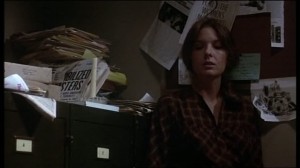 It was then. That doesn’t make it right. But that doesn’t make it different either.” – Comedian Greg Proops on why racist behavior in old movies shouldn’t be excused, but it shouldn’t make them worthless either.
It was then. That doesn’t make it right. But that doesn’t make it different either.” – Comedian Greg Proops on why racist behavior in old movies shouldn’t be excused, but it shouldn’t make them worthless either.
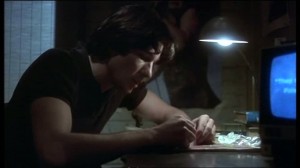 The above quote is a canny way to explain away dated material without condemning it for being what it is. But what about material that was dated when it came out, only the creator didn’t seem aware of it? What about someone like expert blowhard and author Norman Mailer, who in 1987 decided after a 20 year hiatus to write and direct another film, Tough Guys Don’t Dance? The movie is a moldy embarrassment, attempting to distract the audience with an old man’s idea of crudity (“tickle your stick”) and hiding behind film noir as an excuse for rampant voiceover and laughable hardboiled dialogue.
The above quote is a canny way to explain away dated material without condemning it for being what it is. But what about material that was dated when it came out, only the creator didn’t seem aware of it? What about someone like expert blowhard and author Norman Mailer, who in 1987 decided after a 20 year hiatus to write and direct another film, Tough Guys Don’t Dance? The movie is a moldy embarrassment, attempting to distract the audience with an old man’s idea of crudity (“tickle your stick”) and hiding behind film noir as an excuse for rampant voiceover and laughable hardboiled dialogue.
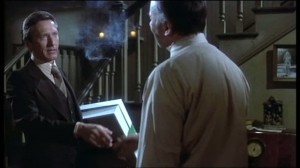 The film is most famous for a moment where star Ryan O’Neal reads a Dear John letter from Isabella Rossellini and screams out, in his best wooden voice, “oh god, oh man, oh god, oh man!” Mailer has the camera spin as if to suggest disorientation, as all of this wasn’t amateurish enough. The trailer for the film tells you all you need to know about the tonal confusion on set. Rather than string together coherent clips from the movie, Mailer stares directly at the camera and reads aloud the cards from the test screenings. They run the gamut from “bold and innovative” to “my grandmother could make a better movie,” while Mailer grins at us. The final card says, “The devil made this picture.” Mailer raises his eyebrow at us to suggest that the movie is somehow dangerous, which couldn’t be less true.
The film is most famous for a moment where star Ryan O’Neal reads a Dear John letter from Isabella Rossellini and screams out, in his best wooden voice, “oh god, oh man, oh god, oh man!” Mailer has the camera spin as if to suggest disorientation, as all of this wasn’t amateurish enough. The trailer for the film tells you all you need to know about the tonal confusion on set. Rather than string together coherent clips from the movie, Mailer stares directly at the camera and reads aloud the cards from the test screenings. They run the gamut from “bold and innovative” to “my grandmother could make a better movie,” while Mailer grins at us. The final card says, “The devil made this picture.” Mailer raises his eyebrow at us to suggest that the movie is somehow dangerous, which couldn’t be less true.
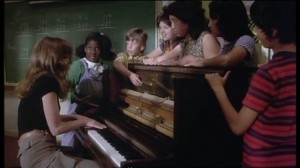 Writer/director Richard Brooks had been pulling the Mailer routine long before even Mailer thought of it. His salad days of Cat on a Hot Tin Roof and Elmer Gantry behind him, Brooks, using Ryan O’Neal as Mailer did, as a perpetual stooge who is supposed to be an audience surrogate, made his final film, 1985’s Fever Pitch, one of the most loony and garbled of all studio films. Fever Pitch follows O’Neal as a journalist doing a story on gambling and casinos, uncovering all sorts of shocking secrets (get this, casinos make money!), while flashing back to O’Neal’s own gambling losses and the pain that caused his wife and child. Then he gets pushed into some mustard at the horse track, right in front of his insufferable, lisping, blond moppet. Well, that happens somewhere in the film, and Brooks is committed to fitting as many different things as he can into a 95 minute movie, so it ends up being 3 or 4 awful films at the same time. His concession to the time was to add totally extraneous graphic violence and scenes of nude prostitutes whenever possible.
Writer/director Richard Brooks had been pulling the Mailer routine long before even Mailer thought of it. His salad days of Cat on a Hot Tin Roof and Elmer Gantry behind him, Brooks, using Ryan O’Neal as Mailer did, as a perpetual stooge who is supposed to be an audience surrogate, made his final film, 1985’s Fever Pitch, one of the most loony and garbled of all studio films. Fever Pitch follows O’Neal as a journalist doing a story on gambling and casinos, uncovering all sorts of shocking secrets (get this, casinos make money!), while flashing back to O’Neal’s own gambling losses and the pain that caused his wife and child. Then he gets pushed into some mustard at the horse track, right in front of his insufferable, lisping, blond moppet. Well, that happens somewhere in the film, and Brooks is committed to fitting as many different things as he can into a 95 minute movie, so it ends up being 3 or 4 awful films at the same time. His concession to the time was to add totally extraneous graphic violence and scenes of nude prostitutes whenever possible.
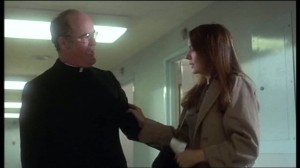 The thing is, Fever Pitch still plays exactly as if it were made in 1951, only with the added nods to the fact that we’re in the 1980s. Brooks didn’t develop this habit during Fever Pitch, he’d actually been doing it for years, especially with his Oscar-nominated adaptation of Judith Rossner’s best-selling book, Looking for Mr. Goodbar. Goodbar features flash forwards and flashbacks, hallucinations so hammy they would fit right into a Naked Gun movie, and religious and sexual subtext so heavy-handed that will make you think that if a studio couldn’t get Oliver Stone, Brooks would be next on the speed dial.
The thing is, Fever Pitch still plays exactly as if it were made in 1951, only with the added nods to the fact that we’re in the 1980s. Brooks didn’t develop this habit during Fever Pitch, he’d actually been doing it for years, especially with his Oscar-nominated adaptation of Judith Rossner’s best-selling book, Looking for Mr. Goodbar. Goodbar features flash forwards and flashbacks, hallucinations so hammy they would fit right into a Naked Gun movie, and religious and sexual subtext so heavy-handed that will make you think that if a studio couldn’t get Oliver Stone, Brooks would be next on the speed dial.
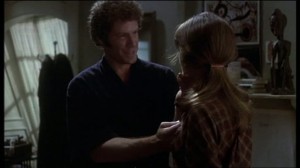 The novel is about feminism and the dangers of letting experimental and potentially violent sexual escapades with strangers go too far. The movie, which stars Diane Keaton (in the same year she won an Oscar for Annie Hall), is about why women should obey their fathers, never have sex, especially never pick up a man at a bar, and should only look to marry good Catholic boys, lest they suffer the worst possible fate. It’s anti-feminist if anything, and it makes Keaton’s character so confusing that she manages to be both idiotic and naïve, while supposedly being a very intelligent teacher. Her character, Theresa, teaches deaf children, but while well-educated, seems unaware that abortion is legal by 1975 when the film opens (her sister, played by Tuesday Weld, has to go to Puerto Rico to get one), proven by the fact that Brooks has newsreel footage running behind her on TV, talking about women’s rights and progression, and Theresa turns around only when the narrator mentions the legality of abortion, with a completely shocked look on her face, as if she had no idea.
The novel is about feminism and the dangers of letting experimental and potentially violent sexual escapades with strangers go too far. The movie, which stars Diane Keaton (in the same year she won an Oscar for Annie Hall), is about why women should obey their fathers, never have sex, especially never pick up a man at a bar, and should only look to marry good Catholic boys, lest they suffer the worst possible fate. It’s anti-feminist if anything, and it makes Keaton’s character so confusing that she manages to be both idiotic and naïve, while supposedly being a very intelligent teacher. Her character, Theresa, teaches deaf children, but while well-educated, seems unaware that abortion is legal by 1975 when the film opens (her sister, played by Tuesday Weld, has to go to Puerto Rico to get one), proven by the fact that Brooks has newsreel footage running behind her on TV, talking about women’s rights and progression, and Theresa turns around only when the narrator mentions the legality of abortion, with a completely shocked look on her face, as if she had no idea.
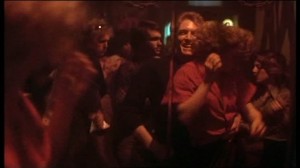 Theresa’s lack of knowledge about women’s rights isn’t the extent of her idiocy. No, she doesn’t seem aware of how sex works at all, exemplified by her seductive behavior during an early encounter with her college professor* (is she supposed to be a virgin?), and yet she has to have premature ejaculation explained to her. And why she feels the need to tell her students, none of whom appear to be over the age of 8, that she’s late for school because she “took a pill” (a Quaalude) that made her oversleep, I have no idea. She also is stunned by the appearance of a condom, not knowing how to react when her suitor, William Atherton, is wearing one. Yet, this is after she’s slept with Richard Gere’s character (Gere appears to be playing Robert De Niro in Mean Streets), who has already threatened her with a knife, which then turned a glowing object that is either a dildo or a light saber, but still just a knife, while he jumps around the room in his jockstrap.
Theresa’s lack of knowledge about women’s rights isn’t the extent of her idiocy. No, she doesn’t seem aware of how sex works at all, exemplified by her seductive behavior during an early encounter with her college professor* (is she supposed to be a virgin?), and yet she has to have premature ejaculation explained to her. And why she feels the need to tell her students, none of whom appear to be over the age of 8, that she’s late for school because she “took a pill” (a Quaalude) that made her oversleep, I have no idea. She also is stunned by the appearance of a condom, not knowing how to react when her suitor, William Atherton, is wearing one. Yet, this is after she’s slept with Richard Gere’s character (Gere appears to be playing Robert De Niro in Mean Streets), who has already threatened her with a knife, which then turned a glowing object that is either a dildo or a light saber, but still just a knife, while he jumps around the room in his jockstrap.
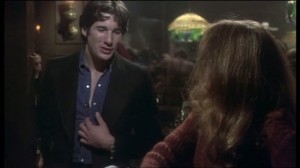 The dildo must have been Brooks’ idea of shocking, along with the scene where she watches home porn loops with her sister. It’s not that she’s in a drug induced haze, or that Theresa is simply a ditz. No, the drug induced haze isn’t until much later, but she doesn’t suddenly turn less rational because of it. Brooks has no way out of scenes unless she behaves like a moron (especially the condom scene, where people are either yelling or laughing at each other), or he creates false suspense by amping up the foley work in the train station, as steps suddenly sound booming. Maybe these tricks were Brooks’ idea of revolutionary style**, but most of his elliptical and surreal devices were new back in 1966, when John Frankenheimer used them in Seconds. The fact that Theresa is only ever moments away from a hallucination doesn’t explain away why Goodbar is totally illogical some of the time, and full on Reefer Madness-style cautionary tale camp all the time.
The dildo must have been Brooks’ idea of shocking, along with the scene where she watches home porn loops with her sister. It’s not that she’s in a drug induced haze, or that Theresa is simply a ditz. No, the drug induced haze isn’t until much later, but she doesn’t suddenly turn less rational because of it. Brooks has no way out of scenes unless she behaves like a moron (especially the condom scene, where people are either yelling or laughing at each other), or he creates false suspense by amping up the foley work in the train station, as steps suddenly sound booming. Maybe these tricks were Brooks’ idea of revolutionary style**, but most of his elliptical and surreal devices were new back in 1966, when John Frankenheimer used them in Seconds. The fact that Theresa is only ever moments away from a hallucination doesn’t explain away why Goodbar is totally illogical some of the time, and full on Reefer Madness-style cautionary tale camp all the time.
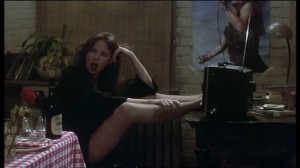 * The professor is a dead ringer for Annie Hall’s Tony Roberts.
* The professor is a dead ringer for Annie Hall’s Tony Roberts.
** One would hope the meta-joke where Theresa is seen at a bar reading The Godfather (which Keaton was in the film adaptation of), and Richard Gere tells her that he’s “seen the movie,” was someone’s idea of revolutionary. Otherwise it’s the sloppiest moment in a movie entirely comprised of them.
Enjoy a musical slideshow of images from Looking for Mr. Goodbar, featuring one of the most famous songs from the soundtrack (the high cost of clearing the music is what is preventing the film from being released on DVD).



